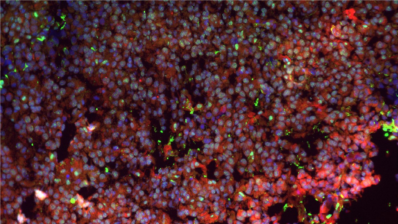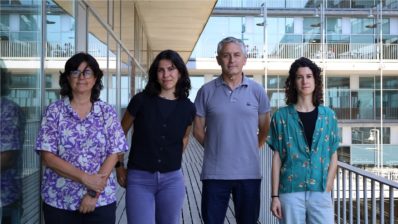A team of researchers from the Hospital del Mar Medical Research Institute (IMIM) and the IIBB-CSIC-IDIBAPS has identified a new marker that makes it possible to diagnose pancreatic cancer in its earliest stages. It is the AXL protein, absent in normal cells, but present on the surface of the cells of some types of cancer. This protein is involved in the growth, migration and invasion of tumour cells.
The study measured blood levels of this protein in 111 patients with pancreatic ductal adenocarcinoma (the most common pancreatic cancer and one of the tumours with the worst prognosis), 37 patients with chronic pancreatitis and 53 healthy patients. The results showed that this protein appears only in patients with tumours. This is of great relevance since pancreatitis is a pathology that can make diagnosis difficult in patients with pancreatic cancer. Moreover, pancreatic cancer is the third leading cause of cancer death in developed countries, and the lack of diagnostic markers is the main problem in its approach, as only 20% of patients can be operated on in time.
Pilar Navarro, co-principal investigator of the study at IMIM, tells us that “the AXL protein already indicates that there are malignant cells. This is an important discovery because other markers appear in preneoplastic lesions even when these do not ultimately lead to a tumour”. The AXL protein is therefore identified as a highly specific marker.
“The AXL protein is a specific marker that tells us that malignant cells are already present”
Pilar Navarro
However, in a small percentage of tumours, the cells do not express the AXL protein. For this reason, the research team wants to direct its next steps towards finding out which patients can benefit from this finding. According to Pablo García de Frutos, co-principal investigator of the study, “knowing why some cancers do not express AXL could give us clues about how tumour mechanisms work and about new targets for treatment”.
Neus Martínez-Bosch*, Helena Cristóbal*, Mar Iglesias, Meritxell Gironella, Luis Barranco, Laura Visa, Domenico Calafato, Silvia Jiménez-Parrado, Julie Earl, Alfredo Carrato, Noemí Manero-Rupérez, Mireia Moreno, Albert Morales, Carmen Guerra, Pilar Navarro*, Pablo García de Frutos*, Soluble AXL is a novel blood marker for early detection of pancreatic ductal adenocarcinoma and differential diagnosis from chronic pancreatitis, eBioMedicine, Volume 75, 2022, 103797, ISSN 2352-3964, https://doi.org/10.1016/j.ebiom.2021.103797.







